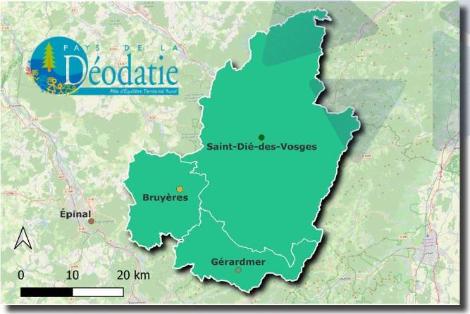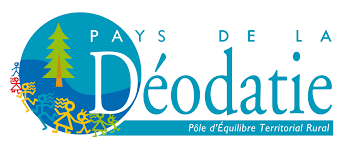Car sharing in Déodatie to meet the economic, social and environmental challenges of mobility
January 2023
Association Nationale des Pôles territoriaux et des Pays (ANPP - Territoires de projet)
As part of its Climate Plan, which aims to reduce energy consumption and greenhouse gas emissions, the Pays de la Déodatie has initiated a project to create car-sharing car parks as part of the CEE (Certificat d’Économie d’Énergie) AcoTE (Acteurs et COllectivités engagés pour l’éco-mobiliTÉ) programme, aimed at « Massifying the use of car-sharing on a daily basis ». Many people living in the Meurthe valley travel to Saint-Dié-des-Vosges every day. So why not share the journey? La Déodatie has embarked on this project.
To download : enquete-mobilite-1.pdf (1.9 MiB)

Mobility is a major issue in rural and peri-urban areas. Dependence on the car is a considerable burden on household budgets (maintenance, energy, vehicle). That’s why various alternatives to the car are being developed, including, in particular, everyday car-sharing. Car pooling could be common sense, as it allows individual vehicles to become collective transport. To develop car-sharing, local authorities can call on service providers who are experts in everyday car-sharing. There are several operators offering carpooling solutions tailored to local areas. They put drivers and passengers in touch via an application available on smartphones. Money transfers are made via the application. Since the Loi d’Orientation et des Mobilités (LOM) of 2019, the legislator has wanted to combat the « white zones » of mobility. To achieve this, it wanted to decentralise the authority for managing mobility to the communities of communes. Until now, this responsibility has historically been vested in the region. The CCs had one year to decide whether or not to take on the responsibility. Once the authority has been obtained, the CCs can decide to delegate this authority to a higher level, the PETR. In its role as a support body, the PETR can raise awareness and support its member EPCIs as they take on the responsibility for mobility. Here, the Déodatie PETR is working with the Communauté d’Agglomération de Saint-Dié-des-Vosges on a CEE AcoTE car-sharing programme.
CEE programmes and public/private partnerships
CEE (Certificat d’Économie d’Énergie) programmes are available to individuals, businesses and local authorities. They provide leverage to finance actions aimed at reducing energy consumption and greenhouse gas emissions. CEEs can be used to renovate buildings or change heating sources, as well as for awareness-raising programmes such as the AcoTE programme. The AcoTE programme, which stands for Acteurs et Collectivités engagés pour l’écomobilité, aims to raise awareness among 25,000 elected representatives and public decision-makers of the virtues of car-sharing and to co-build 100 car-sharing routes between 2019 and 2023. Supported by a consortium of players - ANPP (Association nationale des PETR/Pays), CertiNergy & Solutions, an ENGIE subsidiary specialising in CEE, and LaRoueVerte, a daily car-sharing operator. The programme offers a range of tools, including a website, a network of players and webinars on the subject of mobility, as well as feedback. The CEE is attractive to local authorities in more ways than one. The first year of the CEE programme is free of charge. This includes raising awareness among elected representatives, and the first phase of co-construction of carpooling routes. After the first year, local authorities have to pay a residual amount. This remainder is progressive and allows local authorities to find an economic model for the routes. A public/private partnership such as CEE AcoTE means that the local authority benefits from expert support, feedback from other local authorities, and funding to support innovations such as car-sharing schemes.
The Déodatie example

The Pays de la Déodatie is located in the Grand-Est region of France, in the Vosges department. It is made up of 119 municipalities grouped into three inter-municipal bodies: the Communauté d’Agglomération de Saint-Dié-des-Vosges (CASDDV), the Communauté de Communes Bruyères Vallons des Vosges (CCB2V), and the Communauté de Communes Gérardmer Hautes Vosges. This predominantly rural area has a population of more than 105,000 and a surface area of 1,400km2. The vast majority of people in this area travel by car, often alone in their own vehicle. To combat this, 3 car-sharing routes are being trialled under the AcoTE programme. These 3 routes were identified following joint development with local residents. In terms of passenger flows, there are 300 daily commuters on each of the routes identified. The partnership with the PETR for the CA of Saint-Dié-des-Vosges (the area in which the lines are being tested) has made it possible to mobilise the elected representatives of the catchment area, particularly during the awareness-raising phase.
Reception by local residents
Like Isabelle and Rosa, users of the Ilicov>> routes, the car-sharing routes are well received by local residents, as they have a number of advantages. They save money on fuel, reduce greenhouse gas emissions and, last but not least, create social links. These two users met while carpooling and have been friends ever since. This service allows local residents to « combine business with pleasure » and enables them to take part in an innovative programme. The fifteen-minute journey made by the two users has become a habit. It’s a fully-fledged mobility solution that has come into being thanks to the carpooling lines. For people travelling daily on the routes, the costs are lower and they are no longer obliged to use their car.